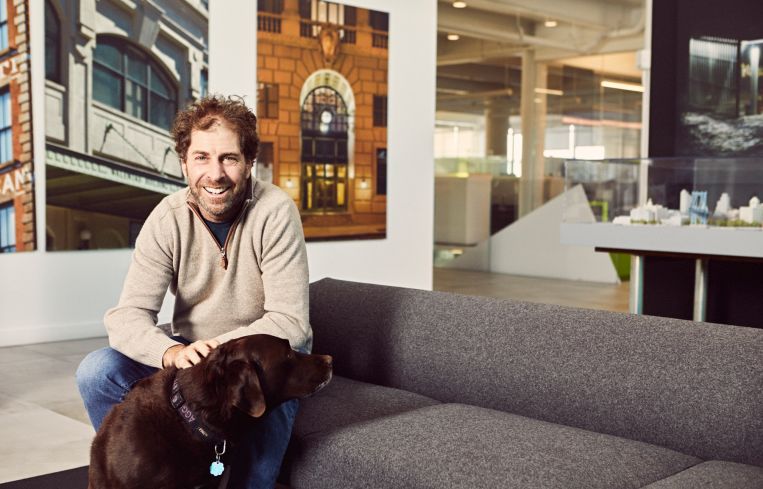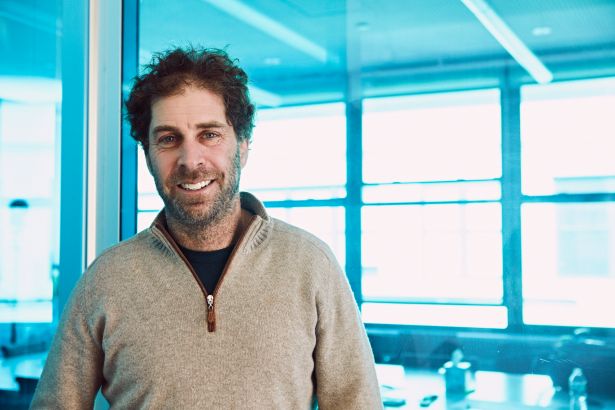Jed Walentas On the Past, Present and Ring-Shaped Future of Two Trees
Inside the thinking of the scion of the Walentas family on Brooklyn — and beyond

Could Jed Walentas have been a journalist?
When the Two Trees Management Company CEO was an undergraduate at the University of Pennsylvania, Walentas was sports editor of the Daily Pennsylvanian, the third-largest newspaper in Philly.
“I probably had 80 to 90 percent of my credits to graduate after two and a half years,” Walentas said from the 12th-floor office of Two Trees’ Dumbo, Brooklyn, headquarters at 45 Main Street. So, he spent his junior and senior years banging away in the Daily Pennsylvanian’s office until 4 o’clock every morning. “I traveled every weekend with all the stupid teams — it was fun.” After college he was offered a job at the New York Post.
But it seems absurd to think that Jed Walentas could have had a life outside of real estate.
That’s because there might not be any name in Brooklyn more closely associated with the profession than “Walentas.” Walentas’ parents, David and Jane, single-handedly transformed the scruffy, industrial wasteland nestled between the Brooklyn and Manhattan bridges into Dumbo, one of the most expensive and sought-after neighborhoods in all five boroughs, if not the East Coast. (To wit: Just last month Walentas’ would-be employer, the Post, reported that there were only 16 apartments for rent on StreetEasy in all of Dumbo.)
Moreover, David, (who handed the reins over to Jed about a decade ago; Jane passed away in 2020) was among the more colorful figures in the business. He self-identified as a “dictator,” with no qualms about gleefully taunting local politicians in the press. (“He’s never run anything and has no ideas,” David told New York magazine about then-Mayor Bill de Blasio. He said much, much worse about others.) But David was also a vital force in getting, say, Jacques Torres, to open a shop on Water Street, or putting the St. Ann’s Warehouse in a former spice milling factory.

Two Trees leveled up in 2013 when its plans to redevelop the Domino sugar complex along the South Williamsburg waterfront were approved. And last year the company fought and won a battle to get a 1.3 million-square-foot, mixed-use project, called River Ring, approved. Bjarke Ingles and James Corner Field Operations are designing the project, which is just north of Domino.
All this Brooklyn development could have easily gone awry, especially in the last two years. But Jed Walentas doesn’t sound worried. If anything, it’s the opposite. Thoughtful, with a head of brown curls, the 47-year-old unmarried father of a 10-year-old son, Theo, and an 8-year-old daughter, Filo, (and two dogs named Aggie and Ludi), talked to Commercial Observer about the past, present and future of Two Trees, under the quiet rumble of the occasional F train.
The conversation has been condensed and edited for clarity.
Commercial Observer: Did you get any pressure from your dad to go into real estate?
Jed Walentas: Pressure is a weird word. No, never pressure. They always, if anything, pushed me to go do other things. That said, in my household their whole lives were the company. It was a full-time, 24-hour, seven-day-a-week effort to survive. And my dad also has a personality type where it was completely consuming to him — in both good and bad ways. So, while there was never pressure — or really even commentary, like, “you’re gonna do this or not” — it was all we talked about at night. And I was an only child and was raised a little bit like an adult. We had dinners out; their friends were related to the business. The whole environment was the business.
I’m sure that this question has come up before, but what caused the spark with your parents in Dumbo in particular?
I can’t totally speak for my dad. My dad grew up a poor kid in Rochester, N.Y., and was basically an orphan. His dad had a stroke when he was 5 years old, and was paralyzed. So, his mom sent him and his brother out to basically be — and this is not such a polite terminology, but I don’t know how better to describe it — an “indentured child.”
They went to live on a friend’s farm in the outskirts of Rochester and they got up at 4 o’clock every morning and worked on the farm before school and [he said to me] things like, “I always wanted to be a real estate developer and didn’t even know what that meant.”
He ended up at the University of Virginia on a Navy ROTC scholarship and then came to New York and worked for a management consultant but just wanted to get into the real estate business. He’d go around on weekends and look at buildings.
The real estate business was very different then. Related and Hines and a couple other people really professionalized the business but [back then] the real estate business was old families, and a couple of bookkeepers and maybe one smart finance guy. It was all privately financed; there were no public markets. It wasn’t a professional aspiration the way it is today. Smart kids went to work on Wall Street. To me, Jeff Blau at Related really changed that. They said, “We’re gonna go hire kids that would otherwise go work on Wall Street and build a professional organization.”
But, certainly, 40 years ago none of that stuff existed. So, David’s story is unique and hard. The first time he ever tried to go borrow money he went around to Citibank to borrow $10,000 and they threw him out.
Is it possible to discover a new neighborhood like Dumbo now? Like, do what Two Trees did, taking a defunct neighborhood and creating it?
I think yes and no. Dumbo is definitely special and unique in a lot of ways. It’s on the water; most of the inventory here was preexisting, it had real natural boundaries — not just in the river, but the bridges, the BQE, the Navy Yard, the Heights. It’s geographically very unique. So, will there ever be another like Dumbo Dumbo? No.
But I think from a slightly broader perspective New York City — and all cities — are constantly evolving and there are always going to be neighborhoods that are overlooked. I haven’t spent a lot of time up there, with the exception of Yankee Stadium, but certainly if you look at the South Bronx you have to make an argument that that neighborhood goes through a dramatic transformation over the next generation or two [given the] geographic proximity to Midtown and other business districts, really good transportation, access to the water. You’ve got a lot of fundamentals that are very, very, very positive. With a little leadership, a little luck and a little investment you can accomplish a lot.
Dumbo had [a big] advantage as well: Nobody got displaced. Most neighborhoods that we talk about now have some sort of existing residential population — and there are real concerns about the balance between improving public good, aspects of making the neighborhood safer, making schools better, making the parks better, making transit better. One of the things that was unique about Dumbo is this was all industrial and commercial. It eliminated one of those tensions.

What has it been like developing Domino in Williamsburg versus all the projects you have completed in Dumbo?
I think the two new buildings we built at Domino are extraordinary; I’m really proud of them and love them. I think they’re both really well executed. But new is just different. It resonates differently. It has a different sort of psychological component and feel to it.
From a planning standpoint and economic standpoint: Starting with a clean sheet of paper affords you new opportunities. In some ways, it’s easier. But if you’re coming from a place which we are — we’re trying to create a place where lots of people want to be for lots of different reasons — having an old, and also beautiful, fabric is a huge benefit and a head start. That gave us a way to anchor to Dumbo and makes Domino a little more challenging.
The truth is a lot of the newly constructed neighborhoods in New York City maybe are not the world’s most interesting places. And that doesn’t mean that they’re not economically successful for their investors. It doesn’t mean there are no people who want to live there. In Dumbo, now, it also leads to problems. Buildings are sometimes too deep. The light and air characteristics are not the same. None of these buildings are terribly tall. You don’t have the view opportunities you have to go up 40, 50 stories like we can do with Domino.
But the success of the office [space] at Domino has been really buoying. We had no idea what we were going to have there but our success in the last year has been incredible.
Talk to me a little bit about that.
COVID was super hard for us — like anybody. March, April, May, June 2020 was very hard. Hard professionally. Hard personally. Hard to watch the city go through what it went through. We lost a lot of tenants. We had a lot of people going through tremendous personal struggle.
Unlike a Tishman, or a Related, our office tenants are not big Class A tenants — our office tenants are a woman running a company with eight or 10 employees. And these people thought they were losing their businesses. I had literally 500, 600 conversations with people who didn’t know what the future was going to be [or] how to pay their employees. Very hard, very troubling.
And then the city stabilized in different chunks. After a volatile summer things calmed down a little and the fall was definitely better. People started to get vaccinated.
We opened our office building at 10 Grand Street in the middle of the pandemic. It was a unique office building; not the way people normally design office buildings. Small floor plates, 6,000- to 7,000-foot floors, beautiful views — relatively inefficient because the elevator core takes up a lot of space of the small floor plates. But from a window, or view-to-space standpoint, it is efficient because the whole office has amazing views. You know, we took a real chance to design something new. There were moments we were super nervous. And the reality is we really leased up the entire building in the last 12 months. And it’s just been an overwhelming success story. We’ve got a couple of little spaces left with leases out. I think, in terms of signed leases, we’re up to, I don’t know, 120,000 out of 140,000 feet.
With so many buildings in Manhattan empty now, do you think it’ll hurt the Brooklyn office market?
There are a number of factors if you run a business [in picking] where you want to be. Cost is one parameter — but not the only parameter, or else nobody would be in New York. We’d all be in Anchorage, or some fucking place. So, I would argue it’s not the dominant variable. In some ways [a business’] only asset is its people because it’s human capital. The reason New York thrives is because it wins the fight for the smartest, most energetic — whatever adjectives you want to use — people.
I think Dumbo is the single best value proposition for office space anywhere in the city. If you’re an employer, what’s the atmosphere? What’s the ambience? How do I get my people there? What’s the transit situation? What’s their day-to-day experience like? How safe are the buildings? Are there roof decks to go hang out on? Are there parks around? What can people have for lunch? How safe do they feel coming and going early? Or late? What’s the energy of the place? Who are my fellow tenants in the buildings in the neighborhood?
Twenty-five years ago in Dumbo, I had to compete on price. Now, I would argue it’s a better work experience, to come here and run a company and have your employees come here, than most if not all neighborhoods in Manhattan. Now, if you have a huge workforce coming from New Jersey, or Westchester, it’s harder to get here — [but] if your workforce is in Brooklyn, Queens, Manhattan, Dumbo makes amazing sense. And Williamsburg makes amazing sense. And I think a lot of the psychological barriers have been broken down and will continue to get broken down.
COVID probably helped Two Trees’ assets, certainly in Dumbo. We have big open spaces. All our windows are operable with these giant roof decks where people can go have lunch outside or take meetings outside. We have one of the world’s greatest parks directly across the street.
What are your hopes and expectations for Eric Adams?
High hopes and high expectations! I’ve known Eric a long time — I think the world of him. Really, I think he’s a great human being. I’ve never come across an elected official that has, in my opinion, better instincts and understanding of real block-by-block and street-by-street people, issues, race and ethnicity issues and realities. His time as a cop — especially in the era that he was a cop — gave him a set of experiences that I think have and will continue to serve him very well from an instinctual level.
He’ll have to balance our city’s biggest need right now, which is this overwhelming need for equity — this reckoning with the fact that we’ve taken generations of predominantly Black and brown kids and given them a totally fucked-up go; sent them to basically segregated schools; created not great relationships with the police department; incarcerated lots of them for often relatively benign things in a way that’s totally fucked up and has fucked up a lot of lives — and at the same time understanding the need to deal with crime to get guns off the street. Threading that needle, in today’s world in this city, is a wildly difficult challenge. And I think we couldn’t have a better mayor to execute that than Eric.
I do think he has management inexperience if you want me to articulate a concern — [but] he’s hired a bunch of very talented people. Hopefully they’ll work well together and succeed.
What about the City Council?
Oh, I have no idea. I’ve known Lincoln [Restler, whose district includes Dumbo] a long time. I think Lincoln is super smart and well-intentioned. And I look forward to working with him. I might know none of the others.
So what’s next?
We’re starting our next couple of projects; we have a whole, you know, we probably have another 10 years of work, and we just got the Ring project approved. So as Domino nears completion — we have three more buildings to build at Domino — and then two more buildings and another enormous park to build at River Ring. So [we’re putting] our head down and working hard and doing what we know how to do and execute and hopefully do a better and better job and, and create great places where people want to be.
You started in this business as a child, essentially — has it gotten more complicated?
No, it’s gotten easier. I’m a lot smarter than I was 25 years ago. We’re a lot more financially stable. Like a lot. Like infinitely more. I have a real reputation, which I’d like to think is really good out there. We have a lot of credibility with a lot of relationships that have been hard-earned over 25 years. And I have an amazing group of people in this office.
If you want a fully honest answer, it’s that it’s a little less personally rewarding and challenging and fun, right? Our projects are all a little different, a little nuanced — but things are a lot more fun when you have no idea what you’re doing. You have to learn and you have to figure it out.
![Spanish-language social distancing safety sticker on a concrete footpath stating 'Espere aquí' [Wait here]](https://commercialobserver.com/wp-content/uploads/sites/3/2026/02/footprints-RF-GettyImages-1291244648-WEB.jpg?quality=80&w=355&h=285&crop=1)


